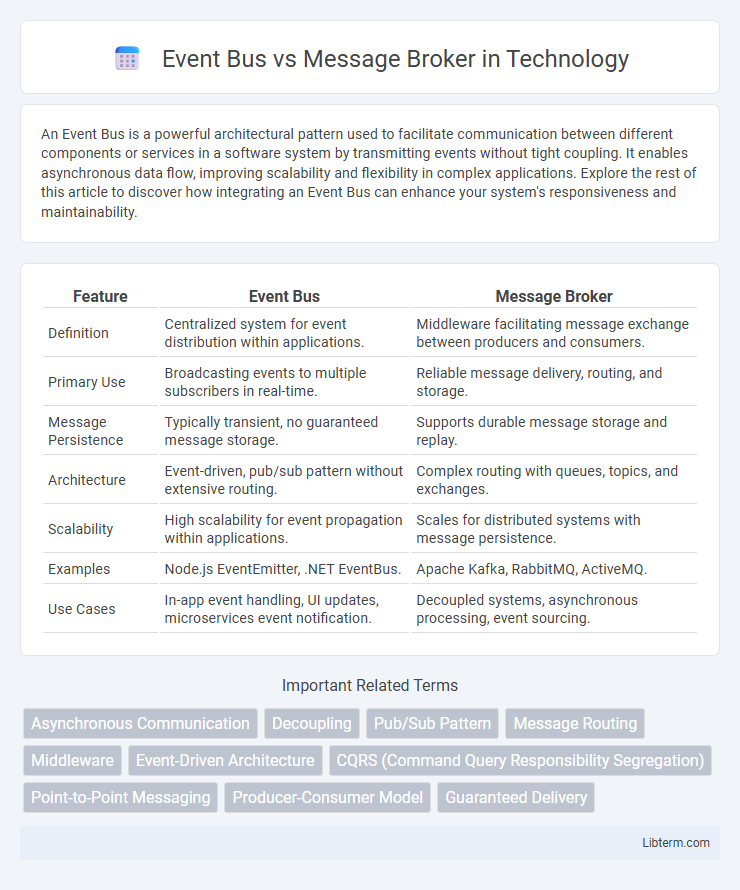An Event Bus is a powerful architectural pattern used to facilitate communication between different components or services in a software system by transmitting events without tight coupling. It enables asynchronous data flow, improving scalability and flexibility in complex applications. Explore the rest of this article to discover how integrating an Event Bus can enhance your system's responsiveness and maintainability.
Table of Comparison
| Feature | Event Bus | Message Broker |
|---|---|---|
| Definition | Centralized system for event distribution within applications. | Middleware facilitating message exchange between producers and consumers. |
| Primary Use | Broadcasting events to multiple subscribers in real-time. | Reliable message delivery, routing, and storage. |
| Message Persistence | Typically transient, no guaranteed message storage. | Supports durable message storage and replay. |
| Architecture | Event-driven, pub/sub pattern without extensive routing. | Complex routing with queues, topics, and exchanges. |
| Scalability | High scalability for event propagation within applications. | Scales for distributed systems with message persistence. |
| Examples | Node.js EventEmitter, .NET EventBus. | Apache Kafka, RabbitMQ, ActiveMQ. |
| Use Cases | In-app event handling, UI updates, microservices event notification. | Decoupled systems, asynchronous processing, event sourcing. |
Introduction to Event Bus and Message Broker
An Event Bus is a lightweight communication system that facilitates the real-time exchange of events between decoupled services within a distributed architecture. A Message Broker acts as an intermediary platform that manages message routing, transformation, and delivery across diverse applications, ensuring reliable communication. Both play crucial roles in event-driven systems, with the Event Bus emphasizing event propagation and the Message Broker focusing on message mediation and persistence.
Core Concepts: What is an Event Bus?
An Event Bus is a communication system that allows different components of a software architecture to publish and subscribe to events, enabling decoupled, asynchronous interaction. It acts as a central channel where events are transmitted, ensuring that multiple subscribers can react to specific events without direct knowledge of each other. This core concept supports scalable and maintainable event-driven systems by facilitating loose coupling and real-time updates across distributed components.
Core Concepts: What is a Message Broker?
A Message Broker is an intermediary software module that translates messages between formal messaging protocols, enabling communication between different systems or applications. It manages message queuing, routing, and transformation, ensuring reliable and asynchronous data exchange across distributed environments. Core features include message persistence, delivery guarantees, and support for multiple communication patterns such as publish/subscribe and point-to-point.
Architectural Differences Between Event Bus and Message Broker
An event bus typically operates as a lightweight, decentralized communication system that enables real-time event propagation without persistent storage, focusing on event broadcasting and subscription within microservices architectures. In contrast, a message broker serves as a centralized middleware that manages message queueing, routing, and durable storage, ensuring guaranteed delivery and complex message workflows across distributed systems. The architectural distinction lies in the event bus's emphasis on direct event distribution and low-latency interactions, while the message broker prioritizes reliability, message persistence, and advanced routing capabilities.
Communication Patterns: Event-driven vs. Message-oriented
Event Bus enables event-driven communication patterns where components react to events asynchronously, promoting loose coupling and real-time data propagation. Message Broker supports message-oriented communication by facilitating reliable, ordered message delivery between producers and consumers, often with advanced routing and persistence capabilities. Both systems enhance inter-service communication but differ in handling message flow and guarantees.
Use Cases: When to Use an Event Bus
An Event Bus excels in scenarios requiring real-time communication within a single application or tightly coupled services, such as UI event handling or intraprocess messaging in microservices architectures. It supports lightweight, low-latency event propagation ideal for broadcasting state changes or triggering synchronous workflows without complex message orchestration. Use an Event Bus when the system demands immediate, decoupled event delivery with minimal overhead rather than guaranteed message persistence or cross-application integration.
Use Cases: When to Use a Message Broker
Message brokers excel in complex, distributed systems requiring reliable, asynchronous communication among diverse services, ensuring message durability and guaranteed delivery. Use cases include microservices architectures, event-driven applications, and enterprise integration where fault tolerance, message routing, and protocol translation are critical. Scenarios involving high throughput, transactional reliability, and multi-language support benefit from message brokers like RabbitMQ, Apache Kafka, or ActiveMQ.
Scalability and Performance Considerations
Event Bus architecture enables high throughput by facilitating direct communication between event producers and consumers, minimizing latency and supporting real-time scalability for distributed systems. Message Brokers introduce message queuing and persistence, which enhance reliability and decouple services but can introduce additional overhead, impacting latency and requiring careful resource management for optimal performance at scale. Choosing between an Event Bus and Message Broker depends on the specific scalability needs, with Event Bus favoring speed and low latency, while Message Brokers prioritize message durability and complex routing capabilities.
Pros and Cons of Event Bus vs Message Broker
Event Bus offers lightweight, real-time event propagation with minimal latency, ideal for tightly coupled systems but struggles with scalability and durability in complex architectures. Message Broker excels in reliable message delivery, persistence, and decoupling services, supporting complex routing and guaranteed processing at the cost of increased latency and system overhead. Choosing between Event Bus and Message Broker depends on system requirements for scalability, fault tolerance, and message reliability.
Choosing the Right Solution: Event Bus or Message Broker
Choosing between an event bus and a message broker depends on the architectural needs and scalability requirements of your system. Event buses excel in lightweight, event-driven designs with simple, real-time event propagation, ideal for microservices communication within the same environment. Message brokers offer advanced features such as message persistence, complex routing, and guaranteed delivery, making them suitable for distributed systems requiring reliability and fault tolerance.
Event Bus Infographic

 libterm.com
libterm.com